This blog post is an augmented version of the article by Anne Pimlott Baker published in the Oxford Dictionary of National Biography, reproduced here with the kind permission of Oxford University Press. Additions to the text are in blue type or square brackets.
Desmond John Dupré (1916–1974), lutenist, guitarist [and viol player], was the third child of Frederick Harold Dupré, analytical chemist, and his wife, Ruth Clarkson, a violinist. He was educated at Merchant Taylors’ School, London, and won a scholarship to St John’s College, Oxford, in 1936, graduating with a first in chemistry in 1940. A conscientious objector, he spent the war as a research chemist in the Glaxo laboratories, where he worked on penicillin.
Dupré had always wanted to be a professional musician, and [aged 30] he studied the cello at the Royal College of Music (1946–8). He was taught there by Ivor James and Herbert Howells. When he became interested in early instrumental music [while still at the RCM] he turned to the guitar, which he had played since he was a child, in order to play the lute repertory, and he also taught himself to play the viol. For a few months in 1946 he gave guitar lessons to the thirteen-year-old Julian Bream.
Julian Bream remembers (in conversation with Thea Abbott, 2 July 2015):
They weren’t conventional lessons, rather they were coaching sessions. We played duets on our guitars and he took me through a tutorial book (Roch’s School of Tárrega: A Modern Method for the Guitar) which was very good for me. He encouraged me to see my practice as a discipline rather than just an opportunity to learn new pieces. When I left my lessons with [Dr Boris] Perott I was in a hell of a state and having to relearn everything, Desmond rebuilt my confidence, he listened to me, suggested improvements in my technique. We only had about four or five sessions together, but it was great … Desmond played an old Panormo, gut strung, and he played with the flesh – not nails. His playing had great charm and he made a good sound, relaxed and evocative.
We stayed friends and he played gamba [cittern and lute] as a member of the Julian Bream Consort, and we made many broadcasts and recordings together over the years.
In 1948 Dupré joined the Boyd Neel Orchestra, [the first modern] chamber orchestra, as a cellist, but he left in 1949 to devote himself to the guitar [and, apparently, he never played the cello again.]
Alfred Deller
Deller met Dupré in 1947 through the Reverend Duncan Thomson, a fellow-alto at St. Paul’s Cathedral, who had heard Dupré playing Dowland on the guitar, and suggested that the two might work together.
They formed a duo […] and, at first, he played the lute parts of the Dowland lute-songs on the guitar. When [in 1948] Deller formed the Amphion Ensemble (which became the Deller Consort in 1950), Dupré was one of the instrumentalists, playing the guitar and viola da gamba.
In 1951 Dupré asked Maurice Vincent to make him a lute [based on the dimensions of Diana Poulton’s instrument] and taught himself to play it in time to accompany Deller on 28 May 1951 at one of a series of recitals of English song at the Wigmore Hall, London, as part of the Festival of Britain.
According to his student, the American lutenist, Hopkinson Smith, he just “figured it out for himself” without reference to any historical treatises!
He and Deller gave recitals all over the country, including favourite Dowland lute-songs such as ‘I saw my lady weep’, ‘Can she excuse my wrongs’, and ‘Come away sweet love’, and the programme always included lute solos such as fantasias by Dowland: Dupré made skillful arrangements of all the songs and solos for their performances.
He made the first of his many recordings [see this discography] with Deller in 1950, performing two Dowland songs [on the guitar]. Here is that 78 rpm record:
‘In darkness let me dwell’ and ‘Fine knacks for ladies’
Their first long-playing record was Shakespeare Songs and Lute Solos in 1955. Here is a track from that disc:
Alfred Deller with Desmond Dupré (lute): ‘Where the bee sucks’ – Robert Johnson
Dupré continued to perform and record with Deller for the rest of his life, touring the world with the Deller Consort and teaching at the Deller Academy, Deller’s summer school in Provence.
After his death Deller wrote:
It is impossible for me to imagine how my career would have developed without his scholarly help and superb gifts as an accompanist … [I] never doubted, even in my most wayward moments that he would be right on cue for the final cadence.
Mark Deller added that he “was delightful to work with, and the most sensitive (if not overtly demonstrative) of players.”
Dupré played an important part in the revival of interest in early music and especially in the restoration of the lute, an instrument that had disappeared from the end of the eighteenth century until Arnold Dolmetsch began to make and play lutes [in the 1890s]. After Dolmetsch’s death in 1940, the only professional lutenist in England was Diana Poulton, a former pupil […].
Please subscribe to this blog – in the top right corner – and receive notifications of new posts by e-mail. In terms of getting information, this is preferable to “liking” the blog (though you can do that too), as Facebook’s money-making system limits the number of people who see our news feed, to as little as 10% of the total sent!
The Lute Society
Dupré attended the inaugural meeting of the Lute Society on 20th October 1956, at which he supported the publication of music in tablature.
At the conclusion, he gave the Society’s very first recital, consisting of Dowland’s, Frog Galliard, Fantasy and Lady Clifton’s Spirit; Francis Cutting’s Variations on Walsingham, Dowland’s Shoemaker’s wife; Robert Johnson’s Toy and Robinson’s Variations on Go from my Window.
Dupré playing Dowland’s ‘My Lady Hunsdon’s Puffe’, on the lute (recorded in 1960)
He was the first president of the Lute Society, from 1965 to 1973 [having been proposed by Ian Harwood, seconded by Robert Spencer and elected nem con.]
Dupré and the viol
At the time that Dupré was teaching himself to play the viola da gamba in 1946/7, the only other professional gamba soloist in the UK was the now completely forgotten Ambrose Gauntlett (1889 – 1978), who was also the principal cellist of the BBC Symphony Orchestra.
The “small (but growing) body of devoted [Dolmetsch viol] students”, mentioned by the music historian Percy Scholes in 1938, still existed no doubt, but they were not much in evidence outside Haslemere. Speaking of which, the Observer critic, Charles Stuart, announced the 21st Dolmetsch Festival in July 1946 as follows: “These are pleasant and passionless occasions [with the] gilded plangency of the harpsichord, [and] the amiable lowings of viola da gamba and violone.”
Apart from appearances with Alfred Deller, Dupré played only once at the Festival, on the tenor viol, in a concert in 1953.
In terms of his instruments, Dupré’s son, John, wrote:
Sadly I no longer have my father’s gamba … however, I do remember it with great pleasure. It was made by John Shaw, in 1688, at the Harp and Hoboy in the Strand, according to the label. This was certainly the instrument he loved best (it had a wonderful bass register), though he did have other antique instruments at various times, including a [1692] Barak Norman bass and a [Henry] Jaye treble [from 1630]. As far as I can recall he had no modern instruments except a tenor. He very rarely played anything but the bass.
In May 1948 he played in the first London performance of Monteverdi’s The Coronation of Poppea, at Morley College (with Deller singing the role of Ottone), and he would often include viola da gamba pieces in his recitals with Deller.
In performances of Bach’s St John Passion, he frequently played both the lute solo accompanying the bass aria ‘Betrachte, meine Seele’ and the obbligato viola da gamba part accompanying the alto in ‘Es ist vollbracht’, and he gave the first of many performances of the viola da gamba part in Monteverdi’s Vespers at King’s College, Cambridge, in July 1951 as part of the Festival of Britain.
Other formations
Dupré formed lasting partnerships with other artists, most notably Thurston Dart, with whom he first played in 1949. The two men performed and recorded Bach’s gamba sonatas and Dart’s reconstruction of Handel’s Concerto for lute and harp Op. 4 No. 6 [with Philomusica].
As members of the Jacobean Ensemble, Dart and Dupré broadcast frequently, with a line-up which included Neville Marriner, Peter Gibbs or Carl Pini (violins), and sometimes gambist Dennis Nesbitt. They made several discs, of Jacobean Consort Music, Purcell’s Sonatas (in 3 and 4 Parts), some Louis Couperin, Les Nations by Francois Couperin and his Pièces de Violes, which you can listen to, by clicking the link on the left.
From 1947 Dupré played bass viol and guitar in the Old Music with Old Instruments Consort with Eric Marshall Johnson (lute, viola d’amore); his wife, Cecily Arnold (soprano, virginals) and Edgar Hunt (recorder, treble viol).
He played the tenor viol in the London Consort of Viols from 1951 [until, at least, 1965 and was involved] in three concerts in the Wigmore Hall series ‘Music by English composers, 1300–1750’ in the summer of 1951. This group had been formed in 1948 by the distinguished viola player Harry Danks, at the request of Sir Steuart Wilson, director of music at the BBC, who wanted to broadcast the riches of the English viol consort repertoire without having to bring in the Schola Cantorum Basiliensis every time.
In 1952 Dupré formed a guitar trio with John Watson and Len Williams (father of John).
Beginning in the early 1950s he gave concerts, often at Morley College, with the London Cantata Ensemble; around 1956 he joined Dennis Nesbitt’s Elizabethan Players (which was later to become the Elizabethan Consort of Viols). Between 1957 and 1960 he was a member of the In Nomine Players. In the 1960s he performed [and recorded] with Musica Reservata [see their discography], the Jaye Consort of Viols and the Julian Bream Consort [playing the lute, cittern and viol].
Dupré was also an occasional member of David Munrow’s Early Music Consort, and appeared on some of their records.
The viol player Jane Ryan worked with him on many occasions, particularly with the Dellers and in the Jaye Consort, whenever a second bass was needed. She described him as a very clever chap who was an excellent musician and had a very good sense of humour.
Here’s another rare example of Dupré in the spotlight, as the solo lutenist with Munrow, on the recorder, and the Morley Consort:
Byrd’s Mounsier’s Almaine from Morley’s The First Booke of Consort Lessons
At Glyndebourne, in 1967, he played the lute and the chitarrone in performances of Raymond Leppard’s reconstruction of Cavalli’s L’Ormindo; [and in 1970 he was also involved in La Calisto.]
Apart from the many records with Deller, he made at least 40 discs with other people.
If you knew Dupré or have additional information about him (or his instruments), please comment below. Your e-mail address will not be shown on the blog, and all comments are moderated before publication.
Early music on the radio
Due to the influence of Professor Gerald Abraham and producers like Basil Lam and Denis Stevens, the BBC Third Programme, established in 1946, became important in introducing early music and unfamiliar old instruments to UK listeners.
According to Stevens (in his fascinating article, Performance Practice on the BBC Third Programme), the new radio station had a “somewhat elitist and esoteric appeal to a limited audience [and its] high standards, originality of research, and accuracy of performance [including the use of authentic instruments] were part and parcel of broadcasting at that time.”
Starting in January 1948, with a television appearance in a series called “Music through the centuries”, Dupré was involved in more than 200 programmes, as a soloist, with his established groups and in ad hoc ensembles formed for specific projects. He also accompanied several singers, including Janet Baker (contralto), John Whitworth and Paul Esswood (counter-tenors), Hugues Cuenod, Robert Tear and Rene Soames (tenors), and Pierre Bernac (baritone), with whom he made three programmes of medieval music.
He occasionally played guitar or lute duets with Julian Bream, in recitals and in specially composed incidental music for radio plays: the first of these, written for two guitars, was for Lorca’s Blood Wedding, broadcast in June 1949.
He played the viola da gamba (with Bream on the lute, and Diana Poulton on chitarrone) when the BBC produced the first complete modern performance of Monteverdi’s Orfeo, with Pierre Bernac in the name part, in June 1952.
In April 1953 he took part in a series of nine programmes of English lute music, organized by Thurston Dart: in these he also played the viola da gamba with Diana Poulton, and the cittern [and lute] with Julian Bream.
Dupré played the guitar in only 12% of his broadcasts; the bass viol in 40%; the tenor viol in just 7%; and the lute for 36% of the time. He used the cittern in seven programmes; the chitarrone in four and the violone and tenor rebec for just one each. In many broadcasts he performed on more than one instrument. Perhaps surprisingly, only 13% of his radio performances involved Alfred Deller or his Consort.
Later repertoire
He did not confine himself to early music: for example, in June 1950 he joined members of the Boyd Neel Orchestra in a performance of Schubert’s quartet for guitar and strings. Dupré sometimes including modern pieces in his concerts, and in 1955 played in a programme of contemporary music at the Royal Festival Hall which included the first English performance of Stravinsky’s Songs for soprano, flute, guitar, and harp.
A very busy musical life
Mark Deller:
Des worked with Alfred and the Deller Consort a great deal from 1947 right up until his death in 1974. Until 1950 I think most of these [concerts] would have been in England. After that, quite a number of concerts together in Holland, Germany, Belgium, Switzerland & later France … and dozens of recordings. First tour of the USA with Alfred in 1953 and many subsequently. Frequent tours of USA with the Consort from early 1960s and then at 2/3 year intervals. South America with Alfred and me (Deller Trio) in 1972 & 73, and we had just done a couple of tours in France and Corsica shortly before he died.
… he was very busy doing all sorts of things and working with many other people apart from Alfred and the Consort. Lutenists were thin on the ground at the time, and he was also a very good gamba player.
Dupré died suddenly on 16 August 1974 in the Kent and Sussex Hospital, Tunbridge Wells, Kent, following a heart attack [on the train] while traveling to join Alfred Deller’s summer school in Provence.
If you appreciate this blog post, please share this link //bit.ly/1gnaOok with your friends.
Acknowledgments
Thanks are due to Thea Abbott; Elaine Andrews of Morley College; Mark Deller; the Dupré family; Chris Goodwin of the Lute Society; Jane Ryan and Hopkinson Smith.
Copyright © 2015 Semibrevity – All Rights Reserved

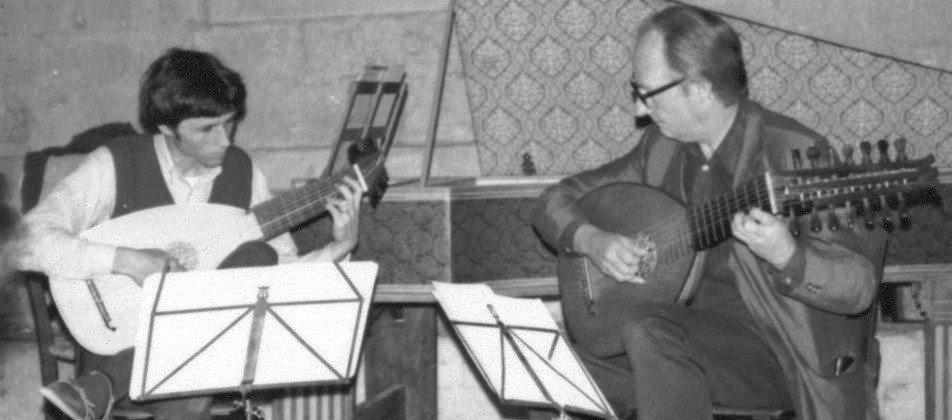
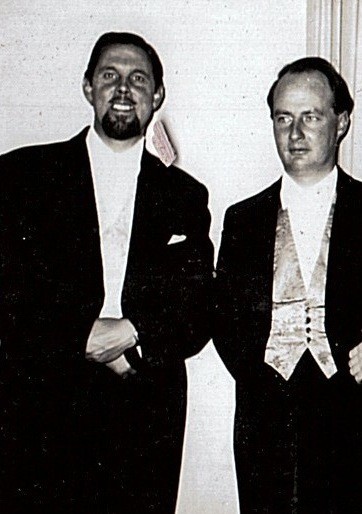
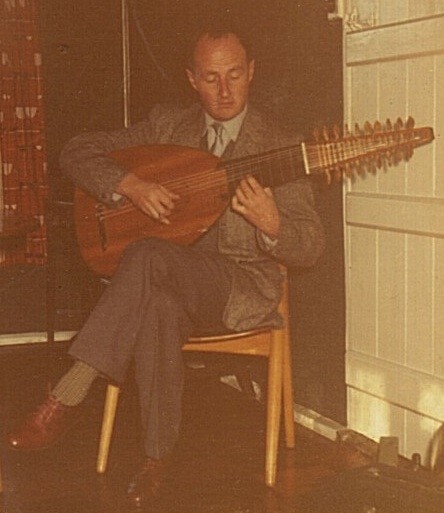
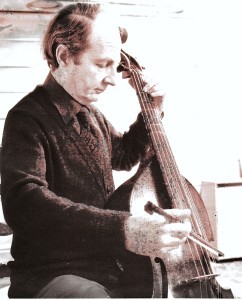
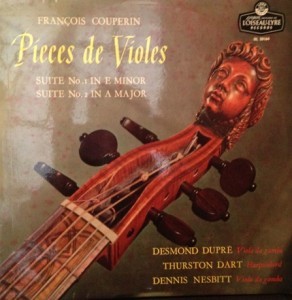
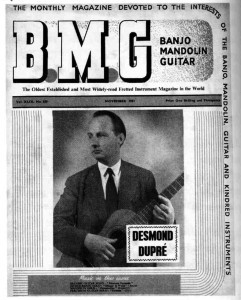
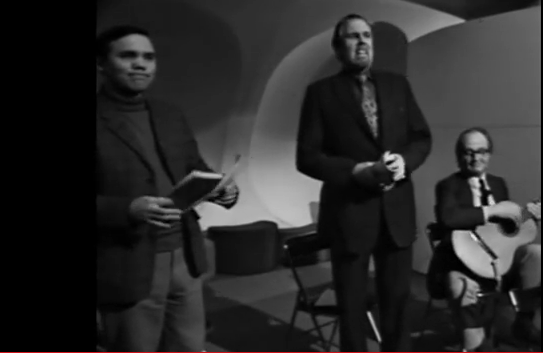
Both Alfred Deller and Desmond Dupré were very important to me. I was a big fan of early music as a teenager in the 1960s. Living in Princeton, N.J., I was lucky enough not only to hear the Deller Consort and Julian Bream, but also to meet them. My first big love (and husband!) was Hopkinson Smith, who encountered the world of early music through our friendship. We went to the Deller Academy in the south of France, and when Alfred and Desmond were in the Boston area, they stayed with us. It was a wonderful enrichment, musically and personally. The summer Desmond died, a heart attack running for the train to come to the summer course, was a wrenching experience. I loved both Alfred and Desmond, and they will be in my heart forever.